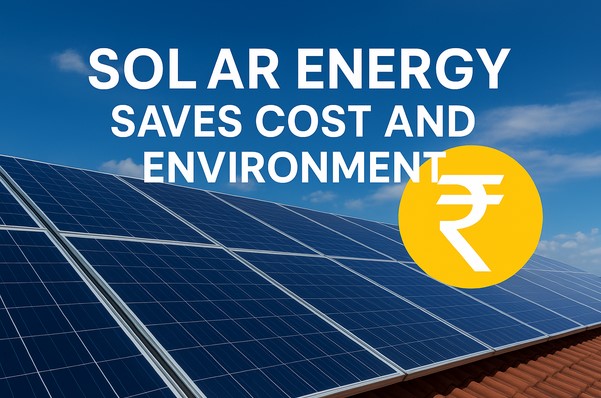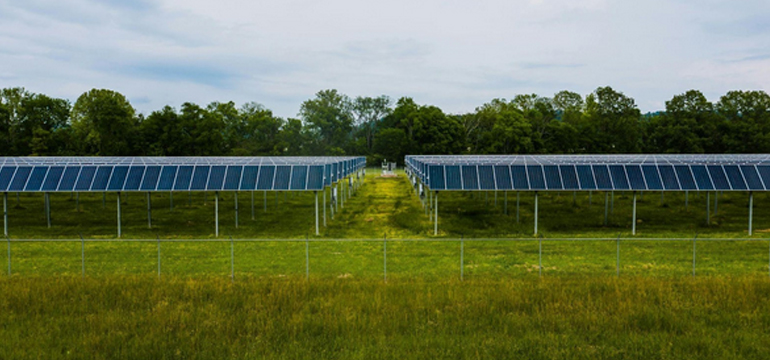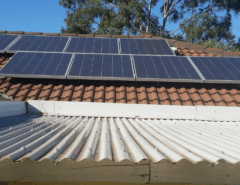Electricity costs in India have been steadily rising. According to the Central Electricity Authority (CEA), the average retail power tariff has grown by nearly 4 to 5% annually in the last decade. As bills are increasing year after year, many households and businesses are turning to solar as a practical solution. In this article, we will break down the potential savings from solar panels for homes and businesses over 25 years and show how they compare with traditional electricity bills.
Understanding the Cost of Solar vs Grid Power
Installing rooftop solar comes with an upfront investment. For example, a 3 kW solar system for a typical urban home costs around ₹2.1 to 2.9 lakh. In comparison, a 10 kW system for a small business may cost between ₹4.8 and 6.5 lakh. These price ranges can vary as they depend on various factors, like location. The Indian government also provides subsidies through the Surya Ghar Yojana. It reduces the effective cost by up to 40% for residential installations.
Grid electricity is paid every month, and the cost keeps rising with tariff hikes. Over 25 years, this has become a significant expense. In the sections below, we will learn how much one can save with solar panels for homes and businesses in three common scenarios:

1. Urban Home
Rooftop solar in urban homes provides immediate relief from rising electricity prices. It pays for itself within a few years and continues to offer clean energy for decades ahead. The following table shows the estimated costs, savings and payback period for a typical urban household in India installing a 3 kW solar system:
| Detail | Estimate Value |
| Upfront cost after subsidy | ₹1.5 to 1.8 lakh |
| Monthly grid bill (before solar) | ₹2,500 (₹30,000 annually) |
| Annual tariff increase assumed | 4% |
| Estimated yearly savings | Year 1: ₹30,000
Year 10: ₹44,000 Year 25: ₹80,000 |
| Cumulative 25-year savings | ₹14 to 16 lakh (Approx) |
| Payback period | 5 to 6 years (after that, nearly 20 years of free energy) |
2. Small Business
For small businesses, a solar system is a smart investment that cuts electricity expenses. It also protects against rising tariffs, which ensures financial stability and long-term savings.
The table below shows the estimated costs, savings and payback for a 10 kW rooftop solar system.
| Detail | Approximate Value |
| Upfront cost after subsidy | ₹5.5 to 6 lakh |
| Monthly grid bill (before solar) | ₹15,000 (₹1.8 lakh annually) |
| Annual tariff increase assumed | 4 to 5% |
| Estimated yearly savings | Year 1: ₹1.8 lakh
Year 10: ₹2.6 lakh Year 25: ₹4.8 lakh |
| Cumulative 25-year savings | ₹60 to 70 lakh |
| Payback period | 4 to 5 years (followed by 20+ years of reduced costs) |
3. Rural Household or Farm Setup
In rural areas, solar panels for homes and farms offer a reliable power supply. It reduces the dependency on diesel. Further, it promotes long-term cost savings, especially in areas where outages are frequent. The given table summarises the estimated costs, savings and benefits of a 5 kW solar system with storage.
| Detail | Approximate Value |
| Upfront cost after subsidy | ₹3 to 3.5 lakh |
| Monthly energy cost (before solar) | ₹5,000 to ₹6,000 (~₹60,000–₹72,000 annually) |
| Annual fuel/electricity cost increase assumed | 5% |
| Estimated yearly savings | Year 1: ₹65,000
Year 10: ₹95,000 Year 25: ₹2 lakh |
| Cumulative 25-year savings | ₹25 to 30 lakh |
| Payback period | 5 to 6 years (after which energy is virtually free) |
The Bigger Picture
India’s solar system adoption is one of the important aspects of its clean and renewable energy goals. We are aiming to reach 40 GW of installed capacity by March 2026 under the Grid-Connected Rooftop Solar programme. This initiative represents the strategic push toward affordable and decentralised renewable energy.
To understand the impact of this target, it helps to look at what solar panels can deliver on the ground. One kilowatt of solar panel typically generates between 1,300 and 1,500 units of electricity annually, which also helps cut carbon emissions over time.
Why Choose Mahindra Solarize?
While the numbers clearly show how solar power delivers massive savings over 25 years, the choice of provider also matters. Mahindra Solarize, part of the trusted Mahindra Group, brings proven expertise in delivering high-quality rooftop solar and large-scale solar solutions across India.
With Mahindra Solarize, customers get end-to-end support. We handle everything from system design and subsidy guidance to installation and long-term maintenance. Our solar panels for home, businesses and rural setups are designed to maximise efficiency and durability. We ensure you enjoy uninterrupted savings and clean energy for decades.
By choosing Mahindra Solarize, you can lower your electricity bills and also contribute to India’s renewable energy mission and a greener future.
#solar panels for home #rooftop solar



